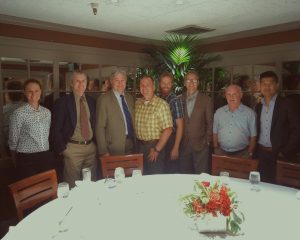August 31, 2016
My Dinner with Senator Whitehouse
Posted by elandau

The group of Utah climate scientists at dinner with Sen. Whitehouse (third from left; blue tie). The author is at far left. Photo used with permission by Annie Putman.
This blog post was written by Annie Putman, a Ph.D. student in the Geology and Geophysics Department at the University of Utah.
On August 8, I dined with climate champion U. S. Senator Sheldon Whitehouse (D-RI) and six Utah academics. The dinner was part of the Senator’s climate tour of Utah to understand how Utahns experience climate change and to persuade Utah Senators to support The American Opportunity Carbon Fee Act, which is designed to reflect the true cost of carbon. Since attending AAAS’s Catalyzing Advocacy in Science and Engineering Workshop in May 2015, I have been looking for opportunities to converse with policy makers and elected officials. What a welcome invitation!
Upon arriving, I found a seat open next to a familiar face, Jim “Professor Powder” Steenburg, a professor in the University of Utah’s Atmospheric Sciences department. We were joined by Byron Adams (Professor, BYU), Logan Mitchell (Postdoc, UU), Rob Davies (Research and Education Associate at Utah Climate Center, USU), Rob Gillies (State Climatologist and Director of Utah Climate Center, USU), and Simon Wang (Associate Professor, Assistant Director of Utah Climate Center, USU). Senator Whitehouse and his Ocean and Coastal Policy Advisor, Adena Leibman, convened us over dinner for a round table discussion.
Senator Whitehouse demonstrated deep passion and an unquestioned grasp of the science in our dialogue. Convinced that scientists are connecting the dots on climate change, Senator Whitehouse and Leibman scribbled notes on Utah scientists’ findings regarding air pollution and summertime temperatures. This meeting followed a particularly hot late July in Salt Lake City, with daytime highs consistently above 100°F and moderate to unhealthy ozone concentrations in the city. We also discussed the decreasing snowpack’s effect on the local water supply and wintertime recreation. Changes to snowpack in the Wasatch range are complex, so it was refreshing to be able to have a nuanced conversation about changes to the elevation of the rain-snow line, changes to timing of spring melt, and the influence of slope aspect on snowpack.
The conversation eventually shifted to science communication and outreach. Rob Davies and Jim Steenburg reflected on how the public response to climate talks they give has changed: argumentative outbursts from attendees are rare now. Whitehouse said that climate change denial is not an inherently conservative position and is largely unsupported by conservative voters under the age of 35. Because of these demographics, the Senator felt that climate skeptics in Congress risk appearing out of step with a growing number of their constituents.
Still, the Senator said that climate skepticism thrives within Congress and is influenced by a well-funded denial apparatus. Senator Whitehouse described climate change denial as a “monster eating our dinner.” To counter the denial, he called for a concerted, organized, and interdisciplinary counterattack through organizations like AAAS, AGU, and AMS, among others.
I appreciated the invitation to the conversation, which was an excellent professional development and science communication opportunity. As a concerned global citizen and climate scientist, I’m encouraged to know we have a curious and well informed public servant advocating strongly within the Senate.








